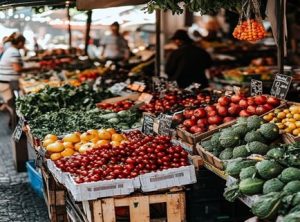CONTENTS
-
NAIRA MARKET UPDATE
-
PETROLEUM
-
AGRICULTURE
-
MASTERING YOUR FINANCES
-
CENTRUM NIP LIVE
Naira Market Update

Naira Market Update: Inflation Rate and Food Prices
The latest inflation rate in Nigeria has been a topic of discussion, especially with regard to its impact on food prices. As you mentioned, understanding the new inflation rate and its effects on food prices is crucial. In this update, we will delve into the current inflation rate, its impact on food prices, and the factors influencing this trend.
Inflation Rate in Nigeria
The National Bureau of Statistics (NBS) reported that Nigeria’s headline inflation rate eased to 23.18% in February 2025, down from 24.48% in January. While this decline may seem promising, food inflation remains a significant concern. The food inflation sub-index stood at 23.51% in February, indicating that food prices continue to rise.
Impact of Inflation on Food Prices
Food price inflation has been a persistent challenge in Nigeria. The NBS reported that food price inflation has consistently been higher than the overall inflation rate. This trend has resulted in increased food prices, affecting household welfare, particularly among low-income individuals.
Factors Influencing Food Price Inflation
Several factors contribute to food price inflation in Nigeria, including:
– Exchange Rate Volatility: Fluctuations in the exchange rate can lead to higher import costs, which are then passed on to consumers. A strong US dollar can make imports more expensive, contributing to higher food prices.
– Transportation and Distribution: Inefficient transportation and distribution systems can increase food prices. Nigeria’s transportation network is often plagued by congestion, corruption, and insecurity, leading to higher costs for food producers and distributors.
– Government Policies: Trade policies, such as tariffs and subsidies, can impact food prices. For instance, tariffs on imported food items can increase their prices, while subsidies on local food production can reduce prices.
– Weather-Related Shocks: Weather-related events, such as droughts or floods, can impact food production and prices. Nigeria’s agricultural sector is often vulnerable to these shocks, leading to price increases.
– Conflict and Insecurity: Conflict and insecurity in Nigeria’s agricultural regions can disrupt food production and distribution, leading to price increases.
Impact on Household Welfare
The effects of food price inflation on household welfare are significant. Low-income households are disproportionately affected, as they spend a larger portion of their income on food. Increased food prices can lead to:
– Reduced Purchasing Power: Higher food prices reduce the purchasing power of households, forcing them to allocate a larger portion of their income to food.
– Inadequate Nutrition: As food prices rise, households may be forced to reduce their food intake or switch to cheaper, less nutritious alternatives.
– Health Issues: Inadequate nutrition can lead to health issues, particularly among vulnerable groups such as children, pregnant women, and the elderly.
Understanding the new inflation rate and its impact on food prices is essential for policymakers and stakeholders. Addressing the factors influencing food price inflation can help mitigate its effects on household welfare. To achieve this, policymakers must implement policies that promote economic growth, reduce poverty, and improve food security.
Petroleum

Dangote Refinery & Market Developments
Nigeria’s petroleum sector faced major disruptions in March 2025, with the Dangote Refinery at the center of the storm. The refinery, which was expected to reduce Nigeria’s reliance on imported refined petroleum products, has been grappling with crude oil supply challenges that could force it to suspend operations.
The issue stems from the high cost of locally sourced crude, which is priced above international market rates, making operations financially unsustainable. Aliko Dangote, chairman of the refinery, has openly criticized the current crude pricing model, arguing that Nigeria’s oil should first serve domestic refiners before being exported.
In a recent development, the Nigerian National Petroleum Company (NNPC) denied claims that it was sabotaging the Dangote Refinery by refusing to sell crude oil in naira. The NNPC boss stated that there are many claimants making false accusations, and that the company is committed to supporting local refineries.
The Nigerian government and the NNPC have stepped in to address the crisis, with discussions focused on ensuring a steady and affordable crude supply to domestic refineries. The federal government is considering policy adjustments, including a possible crude oil allocation system that prioritizes local refiners over international buyers.
Beyond the Dangote Refinery, global crude oil market fluctuations continue to impact Nigeria’s economy. In March, crude prices swung between $85 and $95 per barrel due to geopolitical tensions, OPEC+ production cuts, and shifting demand in major economies.
These fluctuations have led to rising fuel costs in Nigeria, adding inflationary pressure on transportation, goods, and services. The country’s foreign reserves have also been affected as higher import costs strain government revenue.
Market analysts caution that without immediate intervention, Nigeria could remain dependent on fuel imports, further depleting its foreign reserves. They recommend a dual approach—ensuring stable crude supply to local refineries while accelerating investments in alternative energy sources to reduce long-term reliance on petroleum products.
The Dangote Refinery, a $19 billion investment, was expected to transform Nigeria’s energy landscape, reducing fuel importation and stabilizing local prices. However, unless crude supply issues are resolved, its full potential may not be realized.
Policymakers now face mounting pressure to develop a robust framework that guarantees fair crude pricing for domestic refiners, fostering energy security and economic growth.
Economic Implications:
– Increased Dependence on Fuel Imports: Nigeria will continue to rely heavily on fuel imports, depleting its foreign reserves and exacerbating inflationary pressures.
– Inflationary Pressures: Rising fuel costs will add inflationary pressure on transportation, goods, and services, affecting the overall cost of living.
– Impact on Foreign Reserves: Higher import costs will strain government revenue, affecting the country’s foreign reserves.
– Delayed Economic Growth: The refinery’s potential to transform Nigeria’s energy landscape and stabilize local prices will be delayed, hindering economic growth.
Market Developments:
– Global Crude Oil Market Fluctuations: Crude prices swung between $85 and $95 per barrel in March, impacting Nigeria’s economy.
– Policy Adjustments: The federal government is considering policy adjustments, including a crude oil allocation system that prioritizes local refiners over international buyers.
Agriculture
Agriculture in Focus – March 2025
Nigeria’s agricultural sector continues to play a crucial role in the country’s economy, contributing significantly to employment and GDP. However, March 2025 brought both challenges and promising developments in the industry.
- Rising Food Prices and Inflation Concerns
The cost of staple foods such as rice, beans, and maize saw a notable increase in March, driven by logistics challenges, insecurity in key farming regions, and the rising cost of inputs like fertilizers and seeds. The National Bureau of Statistics (NBS) reported that food inflation hit 35.8%, with consumers struggling to afford basic necessities. Farmers continue to call for government intervention to address these challenges and stabilize the sector.
- Government Push for Food Security
In response to rising food costs, the federal government launched new initiatives to boost food production, including subsidies for fertilizer, improved seed distribution, and access to low-interest agricultural loans. The Central Bank of Nigeria (CBN) reaffirmed its commitment to supporting agribusinesses through targeted funding schemes aimed at small and medium-scale farmers.
Additionally, the Nigerian Incentive-Based Risk Sharing System for Agricultural Lending (NIRSAL) announced an expansion of its insurance programs to protect farmers against climate change risks such as droughts and flooding, which have heavily impacted yields in recent years.
- Investment in Agritech
Private sector investments in agritech startups have been on the rise, with digital platforms providing farmers with better access to markets, financing, and real-time agricultural data. Companies like FarmCrowdy and Thrive Agric have expanded operations, leveraging technology to connect farmers directly with buyers and optimize productivity.
- Export Growth and Global Partnerships
Despite domestic challenges, Nigeria’s agricultural exports showed growth in March, particularly in commodities such as cocoa, sesame seeds, and cashew nuts. Increased demand from European and Asian markets has encouraged more investment in cash crops, providing an economic boost to farmers. The government is also negotiating new trade agreements to expand Nigeria’s presence in the global agricultural market.
- Looking Ahead
While the agricultural sector remains vital to Nigeria’s economic stability, continued investment in mechanization, irrigation, and policy reforms will be critical in ensuring long-term growth and food security. Stakeholders are calling for improved rural infrastructure, better security for farmers, and enhanced financial support to make agriculture more profitable and sustainable.
Mastering Your Finances

Expert Tips for a Secure Future
Managing your finances effectively is crucial for achieving financial stability, security, and freedom. Here are some detailed financial tips to help you take control of your finances:
Budgeting
- Track your expenses: Record every transaction, no matter how small, to understand where your money is going.
- Create a budget plan: Allocate 50% of your income towards necessary expenses (housing, utilities, food), 30% towards discretionary spending, and 20% towards saving and debt repayment.
- Prioritize needs over wants: Distinguish between essential expenses and discretionary spending.
Saving
- Set financial goals: Identify short-term (emergency fund, vacation) and long-term goals (retirement, down payment).
- Automate savings: Set up automatic transfers from your checking account to your savings or investment accounts.
- Take advantage of employer matching: Contribute to tax-advantaged retirement accounts, such as 401(k) or IRA.
Debt Management
- List and prioritize debts: Focus on high-interest debts (credit cards, personal loans) first.
- Consolidate debt: Consider balance transfer credit cards or debt consolidation loans.
- Pay more than the minimum: Increase payments to reduce principal balances and interest charges.
Investing
- Diversify your portfolio: Spread investments across asset classes (stocks, bonds, real estate).
- Start with a solid foundation: Invest in a tax-efficient index fund or ETF.
- Monitor and adjust: Periodically review and rebalance your portfolio.
Retirement Planning
- Start early: Contribute to a retirement account as soon as possible.
- Maximize contributions: Take advantage of employer matching and contribute as much as allowed.
- Diversify your retirement income: Consider multiple sources, such as pensions, Social Security, and personal savings.
Insurance and Risk Management
- Assess your insurance needs: Evaluate coverage for health, life, disability, and property.
- Choose adequate coverage: Select policies that provide sufficient protection.
- Review and adjust: Periodically review policies and adjust coverage as needed.
Tax Planning
- Understand tax laws: Familiarize yourself with tax deductions, credits, and exemptions.
- Take advantage of tax-advantaged accounts: Utilize tax-deferred retirement accounts and tax-free savings accounts.
- Consult a tax professional: Seek guidance from a tax expert to optimize your tax strategy.
By following these financial tips, you’ll be well on your way to achieving financial stability and security. Remember to stay informed, adapt to changes, and seek professional advice when needed.
Ready to take control of your finances? Contact Centrum Finance, your trusted partner in financial planning and management. Our team of experts is dedicated to helping you achieve your financial goals. Schedule a consultation today.
Mastering Your Finances

Expert Tips for a Secure Future
We are excited to announce that you can now send money to Centrum Finance directly using the NIBSS Instant Payment (NIP) service from your bank’s mobile app, USSD, or internet banking. No more waiting periods—enjoy seamless, real-time transactions with just a few clicks!
Why This Matters for You
- Instant Transfers – Send and receive money within seconds.
- Greater Convenience – No need to visit a physical bank; transfer funds anytime, anywhere.
- Secure Transactions – Your transfers are safe, fast, and reliable.
How to Send Money to Centrum Finance Using NIP
- Log in to your bank’s mobile app, USSD, or online banking.
- Select “Transfer” and choose “Other Banks”.
- Search for and select Centrum Finance as the recipient bank.
- Enter the amount you wish to transfer and confirm the transaction.
- That’s it! Your funds will be credited instantly.
For any questions or assistance, our customer service team is always here to help.
SOURCES: Nariametrics, Businessday, istock images, Punch newspaper, leadership news, vanguard news, Daily Times Nigeria
DISCLAIMER
This publication is produced by Centrum Finance Company Limited solely for the information of users who are expected to make their own investment decisions without undue reliance on any information or opinions contained herein. The opinions contained in the report should not be interpreted as an offer to sell, or a solicitation of any offer to buy any investment. Whilst every care has been taken in preparing this document, no responsibility or liability is accepted by any member of the Company for actions taken because of the information provided in this publication.


